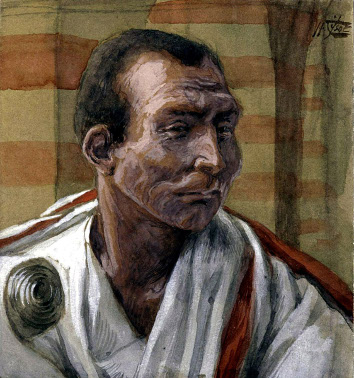
Pontius Pilate (Tissot)
The territory of Judea was not a good posting for Pontius Pilate: far from the seat of power in Rome, he was out of touch with the important developments in the Senate and Praetorian Guard. It was a volatile area, full of rebellious people. Vassal kings, various ethnic groups, and religious factions (like the Pharisees and Sadducees) were in constant friction with one another.
Now, during the Jewish Passover, Jews from all over the Empire were making their pilgrimage to Jerusalem to participate in the sacrifices. And Pilate had to go too, to show that Rome would not tolerate any outbursts of nationalism. Every so often, somebody would stand up, claiming to be an anointed king (messiah), eager to lead the people in a rebellion against Rome. So Pilate had to leave his nice residence in Caesarea — a modern, civilized, coastal community — and travel inland to that city which was the heart of his administrative problems.
Pilate (like most people in positions of power) had to be constantly on guard against being manipulated by one or another of the local interest groups.
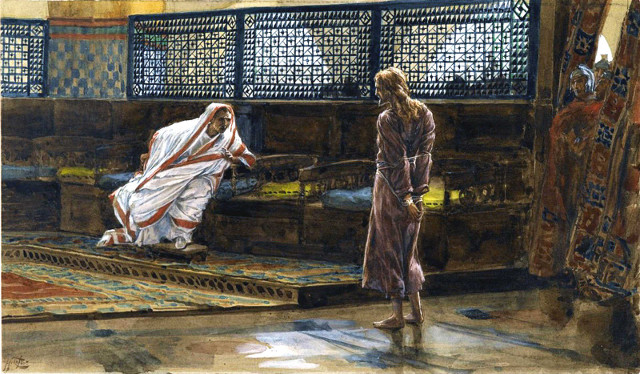
Jesus before Pontius Pilate
Now, the Jewish chief priests had brought him another messiah pretender that they wanted executed: an unimpressive-looking man, with the common Jewish name Yeshua. Maybe Pilate could get a quick admission of guilt and be done with it.
 Are you the king of the Jews?
Are you the king of the Jews? Do you say this from yourself, or do others say it about me?
Do you say this from yourself, or do others say it about me?Pilate knew immediately that something was wrong. This prisoner was questioning him? Pilate had sat in the judgment seat of the praetorium many times. Prisoners never dared to question him. This man not only seemed unconcerned that Pilate held his life in the balance, but he was hinting that Pilate was being manipulated. And Pilate suspected that it was true.
 Am I a Jew? Your own people, even the chief priests, delivered you over to me! What did you do?
Am I a Jew? Your own people, even the chief priests, delivered you over to me! What did you do? My kingdom is not from this world. If my kingdom were from this world, my attendants would be fighting to keep me from being delivered over to the Jews. But now my kingdom is not from here.
My kingdom is not from this world. If my kingdom were from this world, my attendants would be fighting to keep me from being delivered over to the Jews. But now my kingdom is not from here.Pilate was surprised. The prisoner actually admitted to being a king, but seemed to be distancing himself from "the Jews." He spoke almost as if they were foreign to him. And he was speaking to Pilate not as to a powerful Roman governor, but as if Pilate were some minor functionary in a subordinate kingdom! Either the man was insane, or he was really some kind of king.
Pilate knew that the Jews had been scattered as far as Babylon to the east and Africa in the west. For all he knew, this man, who spoke with the authority of a king, might be some minor king from outside the Empire. Maybe he had come for Passover, had been separated from his attendants, had said the wrong thing to the wrong person, and fallen into the hands of the Jewish authorities.
Pilate knew better than to risk killing a foreign king without knowing if he was a "friend of Caesar" or not...
When is a king not a king?
"King" is a term which can mean different things, functionally.

King George VI of England
For example, King George VI, the most recent "king" of England (until 1952) had much less power than King George III (the king during the secession of the American colonies, to whom the Declaration of Independence was addressed). When the subjects of George III said "king," they meant something completely different than modern British citizens mean when they use the same word.
On the other hand, the word "President," in the context of the United States, has taken the opposite historical path. If you time-traveled to the year 1800, and tried to describe the current United States presidents to Americans of the past, you would be more truthful (functionally) to say "King George Bush" or "King Barack Obama."

King George Bush
and King Abdullah
Then they would nod and ask: "How did things go so wrong?" And you would sigh and say, "Well, you know that Constitution you approved about 10 years ago? It had some major problems...
Is Jesus a King?
Modern Christians have a similar problem with the term "king". For some Christians, "Jesus is king" means: "Jesus will be king, at some point in the future, sitting on a literal throne in some future version of an earthly Jerusalem." These Christians think Jesus is like David in self-exile: after he was anointed by Samuel, but before the reigning king — Saul — had died. At that time, David was stuck in a sort of leadership "limbo": running around the wilderness, gathering followers, but refusing to touch King Saul, "the Lord's anointed." Modern Christians seem to think that God the Father, after anointing His own son, then spent the next 2000 years "anointing" a variety of corrupt human political leaders who we are supposed to always obey (unless their commands go directly against scripture). But we can talk about Daniel 2 and Romans 13 later. Let's get back to Jesus' conversation with Pilate.
 My kingdom is not from this world. If my kingdom were from this world, my attendants would be fighting to keep me from being delivered over to the Jews.
My kingdom is not from this world. If my kingdom were from this world, my attendants would be fighting to keep me from being delivered over to the Jews.Many English translations of this verse read "not of this world." Christians who deny the present reality of Jesus' kingdom prefer the ambiguity of that English word "of". They hear Jesus saying "my kingdom is not over this world." Which, for them, means that it doesn't happen till some time in the future.
But this is just a simple translation problem: the English word "of" can mean "over" in the sense of "having authority over". But the Greek word which underlies that English "of" is "ἐκ," which does not mean "over" (check a good Greek lexicon like the BAGD to verify this). It is better translated as "from": see, for example the NET Bible translation of this verse.
How do we confirm that Jesus didn't mean over (in the sense of "having authority over")? Simple. In Matthew 28:18, Jesus told his disciples:
Notice three things: "All", "on earth" and "has been." Whatever you mean when you talk about the authority of Jesus, it had better fit squarely with the extent of Jesus' own authority claim in Matthew 28:18. Every place "on earth" is already under the authority of Jesus, according to Jesus himself.
So, why did Jesus answer Pilate in that way?
Jesus was not denying the authority which he asserted to the desciples. He was telling Pilate that the power behind His kingdom is the power and authority of God Himself, not man. Pilate's big concern was a Jewish revolt against Rome (which did actually happen about 40 years later, just as Jesus predicted in Matt. 24). All the other kings Pilate knew about (such as Herod and the other vassal kings of Rome) were established by human force and coercion. Jesus doesn't need human coercion to form his kingdom. God only authorizes human coercion under limited circumstances (such as the "judgment" wars against the Amalekites, or defense of self and others against attack); never for kingdom-building. As many human empires discover, conquered people do not make good citizens. Christians, tragically, have often disregarded God's law on this issue.
Jesus also doesn't need to sit on a physical throne in Jerusalem in order to rule his kingdom. He is already in the highest seat of authority in heaven:
Jesus was reassuring Pilate that he wasn't there to threaten Rome. Rome was merely playing a (significant) part of a series of events that had begun over 1500 years previously, before Rome even existed as a political entity. Jesus alluded to this in a later exchange with Pilate, when he said:
 You would have no power at all against me, unless it were given to you from above. Therefore the one having delivered me over to you has greater sin.
You would have no power at all against me, unless it were given to you from above. Therefore the one having delivered me over to you has greater sin.Who was Jesus talking about?
Some history Pilate didn't know
As we read the Gospel of John, we know something which Pilate didn't: Jesus as Messiah/King was the culmination of a 1500-year "lesson in political theology" which God was teaching His chosen people (and us, if we have ears to hear). When God chose Israel, He was their Sovereign King. He gave them a perfect law system (Psalm 19:7) with a decentralized system of judges (Ex.18:25-26, Deut.16:18), and an adjudicating council (multiple people) at the top of the structure (Deut. 17:8-13) which would decide any cases that were voluntarily referred up. Compare this design with the idea of a human "king": centralized civil government with executive and legislative power in the office of one man. This is the pagan style of government, like in Egypt. God told His chosen people (through Moses) that their decentralized law system was ideal, and would be an example to the Gentiles:
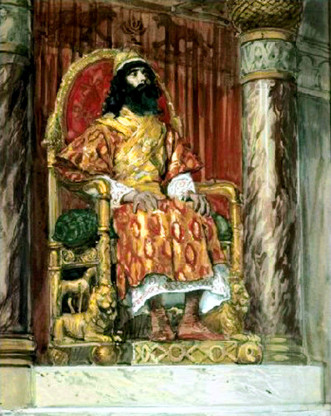
Solomon
There are only seven verses in the entire Torah (Genesis through Deuteronomy) that give laws about a king for God's people (Deut. 17:14-20). God included these verses in His law because He knew that Israel would later reject Him as king and demand a "Gentile-style" human king. Those seven verses don't give the king any power, they are there only to limit the king's power. They explicitly subordinate him to God's written law, saying that he may not deviate "to the left or right," and keep him from being "exalted above his brothers." (Deut. 17:20) Solomon, the "wisest" king, managed to break most of the these laws.
Here's a thought to consider (and weep about): How many times have Christians exalted kings (and "king-like" government officials, such as presidents) above their brothers? This is something we need to repent of, and stop doing.
By the way, the idea that the king himself (and, by extension, any civil government official) is subject to the law is now known as the "Rule of Law." This Biblical concept was "unique in the ancient Near East" (Ska, "Biblical Law and the Origins of Democracy" in The Ten Commandments: The Reciprocity of Faithfulness, 148). God established this limitation on civil government, through Biblical law, thousands of years before so-called "enlightened" men even began taking it seriously.
You won't find that in your school civics textbook. Actually it would be unusual for you to find "rule of law" mentioned at all: I own a few modern textbooks on government that have dropped the concept altogether. Even in professional legal thought, the "rule of law" concept has now been devalued to a weaker idea: "formal rule of law." But I'll address that some other time. Back to the Israelites.
Rejecting God's authority
The Israelites fateful rejection of God as King is recorded in 1 Samuel 8. This was the inciting incident for the rest of scripture; perhaps the most important turning point in the history of Israel.
There are several unifying themes that tie all of scripture together. Here is my short list (not in order of importance):
- the marriage covenant as the foundation of society
- the family as the central governmental institution
- the authority of God as the only true King and civil government as His strictly limited "minister of justice"
- the mercy of God (Grace)
- the justice of God
- the faithfulness of God
All of these themes culminate in the work of Jesus. Whole books could be written on how men (acting in the name of Christ) have tried to distort and pervert these themes in both teaching and practice.
Even now, rejecting or accepting God as the only true King is the most important decision anyone ever makes. Understand that if you reject God's law, you are also rejecting Him as King. There are always consequences to this decision. You may not be establishing your eternal destiny by rejecting God's law, but you will certainly affect your temporal destiny, as we shall see. Heed Matthew 5:19.
The curse of the (merely) human king
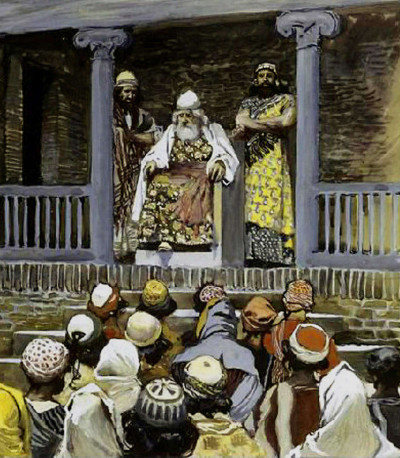
Samuel explaining
the curse of the king
God judged His people by giving them a series of Jewish kings, in order to show them why (merely) human kings are bad. He also warned them in advance (through the prophet Samuel) what to expect. Samuel said that the king would:
- Conscript their sons into his military force (vv.11-12) [conscription is always a violation of Biblical law]
- Conscript their daughters to cook and bake for him (v.13) [know any modern governments that also force people to bake things against their will?]
- Confiscate private property for government purposes (v.14) [know any so-called Christians that support "eminent domain"?]
- Impose 10 percent taxation (v.15-16) [I know what you're thinking. But remember, this was a "judgment" oracle: normal civil government taxation under Biblical law would be much less than 10 percent. Please try to suppress your thought that 10 percent taxation would be a "blessing"]
- Consider the people as servants to the civil government (v.17) [rather than the other way around, as under Biblical law]
Are you starting to see the consequences of rejecting God's law?
We are used to speaking about the "kings of Israel" (like David and Solomon). But the Hebrew scriptures show us something very interesting about the term that God Himself uses to describe those whom He appointed as rulers.
Answering the demand for a 'king' (melek), Yahweh commands Samuel to anoint Saul 'prince' (nagid) (9.16). Samuel then uses this term when he anoints Saul (10.1), and later in relation to David (1 Sam. 13.14), only applying the word melek to Saul in such a way as to distance himself from it (1 Sam. 12:13-17,25). In the view of both Yahweh and Samuel, the new role that is now initiated in Israel continues to be best represented by the term nagid... The characterization of the kings of Israel and Judah as nagid affirms their subordination to the rule of Yahweh. Saul proved unable to stay within the boundaries laid down. The second attempt in Israel to establish royal rule (after Abimelech) ends no more successfully than the first. (McConville, God and Earthly Power, 137-138)
Exile and prophecy
The people got even worse, so He sent them into exile under Gentile kings (some of whom were "better," in a relative sense, than many of the Jewish kings).
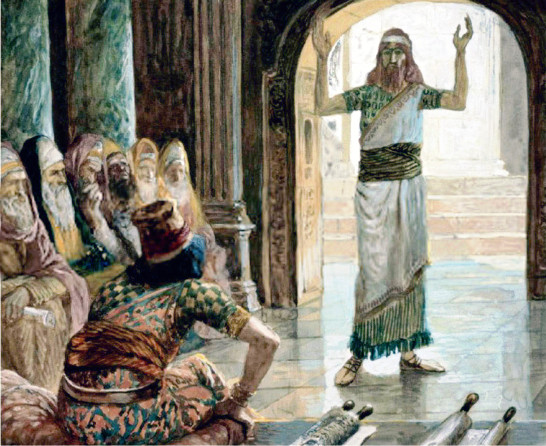
Daniel explaining the statue
to Nebuchadnezzar
The statue prophecy of Daniel 2 foretold that God's people would continue under the Gentile authorities of Babylon (gold), Medo-Persia (silver), Greece (bronze), and Rome (iron). But God promised them a future king who would set things right:
The only way to set things right would be for God Himself to again become king, and for the people to ask for His lordship, just as they had rejected God when asked for a king "like the Gentiles" (1 Sam. 8).
This is the political theology of the New Covenant. If you enter it, you are reversing the sin of the people in 1 Sam. 8. You are admitting that it is wrong to reject God as King, and you are asking to be a citizen in the kingdom of His son, with all the rights and responsibilities that entails. You are also rejecting the lordship claims of any merely human kings. The iron (Rome) has been destroyed. You are no longer under any Gentile authority.
Know the law. Inherit your liberty. Act like a responsible citizen of a reigning king. Be an ambassador, not a legislator. Spread the word of peace and justice.
The consequence of rejecting God's kingship
The Jews of Jesus' day were expecting (either hopefully or fearfully) a military Messiah who would lead a revolt against Rome. Later that century (A.D. 66-70), they got just what they wanted, with millions of deaths and enslavement as a consequence.
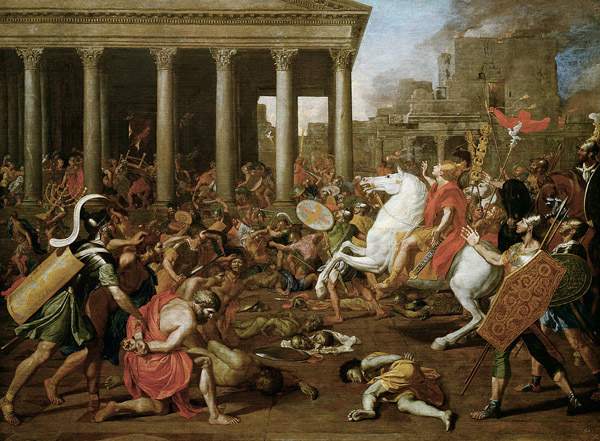
Conquest of Jerusalem
in AD 70
This is one of the themes of scripture: with God as king, you get justice and liberty; reject Him and His law, and you get injustice and slavery. Guaranteed.
The Lord said to me, “You are my Son; today I have begotten you.
Ask of me, and I will make the nations your heritage, and the ends of the earth your possession.
You shall rule them with a rod of iron and dash them in pieces like a potter’s vessel.”
Now therefore, O kings, be wise; be warned, O rulers of the earth.
Serve the Lord with fear, and rejoice with trembling.
Kiss the Son, lest he be angry, and you perish in the way,
for his wrath is quickly kindled. Blessed are all who take refuge in him.
— Psalm 2:7-12 (ESV)
28 For the kingdom is YHWH's; And he is the ruler over the nations.
— Psalm 22:27-28 (ESV)
